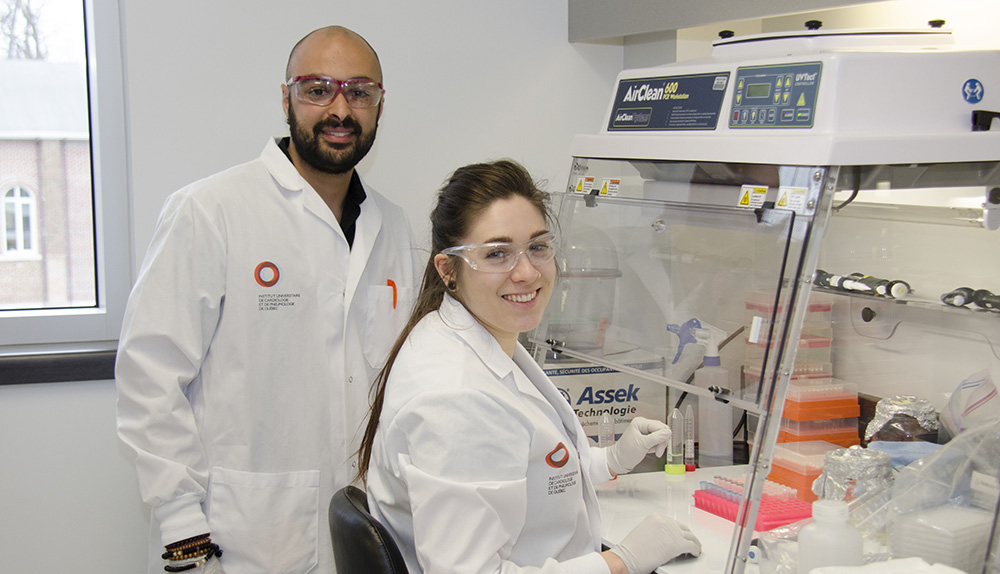Research Today For Advancements Tomorrow
By Anna Guy
 “Discovery, to prevent, to cure, through creating, sharing and applying knowledge for the benefit of the population and people with cardiovascular, respiratory and obesity-related diseases”.
“Discovery, to prevent, to cure, through creating, sharing and applying knowledge for the benefit of the population and people with cardiovascular, respiratory and obesity-related diseases”.
Cardiology, respirology and obesity-related diseases effect hundreds of thousands of Canadians.
Thanks to the men and women at the QHLI Research Centre, major advancements are being made in these societal chronic diseases (SCD) that will directly benefit not only Canadians, but the world.
Business Elite Canada spoke with Dr. Denis Richard, Director of the Research Centre, about the ground-breaking research conducted at the centre for the advancement in the treatment and prevention of the SCDs. To say the work being done is outstanding is an understatement; the the QHLI Research Centre’s world-class researchers are generating some of the mostcutting-edge research in these fields in the world today.
The QHLI is a supraregional hospital offering specialized (tertiary) care and services in cardiology, pulmonology and obesity surgery, serving a population base of over 2 million. The only hospital in Canada to offer in one location specialized and ultraspecialized care and services in cardiology, pulmonology and obesity surgery, it is the hospital with the largest clinical volume in tertiary cardiology in Quebec and Canada in a single location; one of the largest respiratory medicine centres in Canada; and a centre of excellence in bariatric surgery.
“Our Centre is unique in that our research components perfectly complement the Institute’s clinical missions,” says Dr. Richard. “This enables health professionals and researchers to work in total synergy to the greatest benefit of patients. This synergy turns research findings into better care in harmony with the vision of the Fonds de recherche du Québec – Santé (FRQS) and of the Canadian Institutes of Health Research (CIHR).”
“Our research teams harness this synergy for the integrated study of the metabolic triggers of cardiovascular and lung diseases, as well as to develop innovative and competitive Quebec research in disease prevention and treatment. In addition, our unique research-care paradigm allows us to identify research priorities according to the clinical issues arising from the Institute’s subspecialties.”
One of the most rapidly growing research centers in Canada, the QHLI Research Center has quadrupled its employees in the last 20 years. Five major infrastructure grants ($80 M) has allowed QHLI Research Center to initiate and realize an expansion plan with unique clinical and preclinical research core facilities to investigate obesity and other risk factors for Type 2 diabetes, cardiovascular and respiratory diseases.
“Currently, no other academic research setting in Canada is focused understanding the molecular mechanisms underlying SCDs, while at the same time applying basic research findings to prevention and clinical intervention in humans,” says Dr. Richard.
World-Class Research
The QHLI Research Center includes 16 Research Chairs, with two research recently created to center around two of the Centre’s most renown researchers, namely, Dr. Vincenzo Di Marzo and Dr. Josep Rodes-Cabau, who have been recognized among the World’s Most Influential Scientific Minds in 2017. Dr. Rodes-Cabau’s research in transcatheter aortic valve replacement has contributed to such advanced technology that it is regarded as nothing short of a revolution in Aortic stenosis treatment. “The research group on valvular diseases led to by Drs Rodes-Cabau and P Pibarot working at the Institute is considered worldwide as one of the best in this field, says Dr. Richard. “Dr. Di Marzo has been recruited through the Canada Excellence Research Chairs (CERC) Program and leads a unique research program on the microbiome-endocannabinoidome axis in cardiometabolic and respiratory health.“
The QHLI Research Centre is also known for its highly influential research on the (i) cardiovascular complications of visceral obesity (Dr. Jean-Pierre Després), (ii) chronic obstructive pulmonary disease (Dr. François Maltais), (iii) pulmonary arterial hypertension (Drs. Sebastien Bonnet and Steeve Provencher) and (iv) bariatric surgery (Drs. André Tchernof and Laurent Biertho).
The research programs at the QHLI Research Center are based on tight collaborations between clinicians and basic scientists, which keeps the basic science grounded on clinical needs. Over the past decades, they have mounted cutting edge, and sometimes exclusive, experimental capabilities to investigate SCDs.
Indeed, few institutions in the world have the capacity to fully address these critical diseases that need to be tackled by groups combining expertise in obesity, cardiometabolic and respiratory health, inflammation, the complex endocannabinoid system, adipose tissue biology, gut physiology and microbiome profiling.
Public Education
As complex as the research is, one thing is commonly understood: SCDs have a devastating effect on the population. The most current predictions indicate that by 2025, the prevalence obesity, a major risk factors for SCDs, will hover at 25 per cent in adult Canadian men and women.
“We contribute to educating health professionals and the general public regarding the causes, complications, treatment and prevention of SCDs,” says Dr. Richard. “Our research chairs all have knowledge transfer vocations. As but one example, the International Chair of Dr. JP Després has developed an educational website on cardiometabolic risk, which has been visited by people from 168 countries in recent years.”
The research programs at the QHILI Research Centre are based on tight collaborations between clinicians and basic scientists, which keeps the basic science grounded on clinical needs. Over the past decades, we have mounted cutting edge, and sometimes exclusive, experimental capabilities to investigate SCDs.
Other important examples demonstrating how discovery in our milieu will continue to lead to major benefits to Canadians emerges from our research on the etiology of valvular and vascular diseases. Over the past few years, the Centre has made breakthrough discoveries which will certainly benefit from the implementation of the new infrastructure. Currently, the Centre is designing and testing new devices, techniques, and strategies for the optimization of cardiovascular health, and have has pioneered several novel avenues of investigation.
“We have already obtained highly promising results in this regard and we are confident that we will be able, within the next seven years, to introduce new pharmacotherapies able to slow the progression or even induce regression of aortic stenosis and thereby avoid valve replacement surgery in many patients,” says Dr. Richard.
The QHLI team is very well positioned to do efficient and rapid translation of the discoveries to clinical practice. Indeed, it has the expertise, the patient population, the synergy with clinical departments, the infrastructure, the collaborative networks, and the core labs to successfully accomplish the early and late translation phases of its research program.
Concludes Dr. Richard, ”Our research is changing medical practice for the greater well-being of the patients. Without discovery, medical care in cardiology, respirology and obesity would not be what it is today.”






